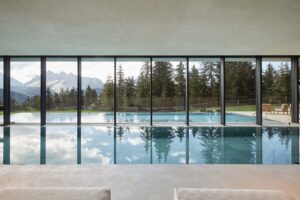
FORESTIS – A Luxury Eco-Conscious Retreat
FORESTIS is a luxury, eco-conscious retreat nestled in the beautiful Dolomite Mountains of Italy.
Portugal
Mood of Living September 14, 2018
São Lourenço do Barrocal, a Portuguese hotel and winery, has been in José António Uva’s family for eight generations. Its history stretches back thousands of years to the days when prehistoric people constructed stone structures on the land that are still standing to this day. To visit São Lourenço do Barrocal now is to step outside of the modern world. Centuries-old vineyards and olive groves sprawl across vast stretches of the property, cattle roam the countryside, and the view of the stars at night is so clear that the surrounding region was named the first “Starlight Tourism Destination.”
Visiting São Lourenço do Barrocal as a child, José was enchanted by it. As an adult, he embarked on a journey to restore the estate to its former glory, so that it could once more embody the freedom and tranquility that he once experienced. São Lourenço do Barrocal is still a farm estate rich in history and heritage, but it is also a hotel. Guests can stay in rooms that were once barns or farmhouses, explore the gardens and meadows, dine at a farm-to-table restaurant with food sourced from the estate’s grounds, and revel in the simple beauty of life in the Portuguese countryside.
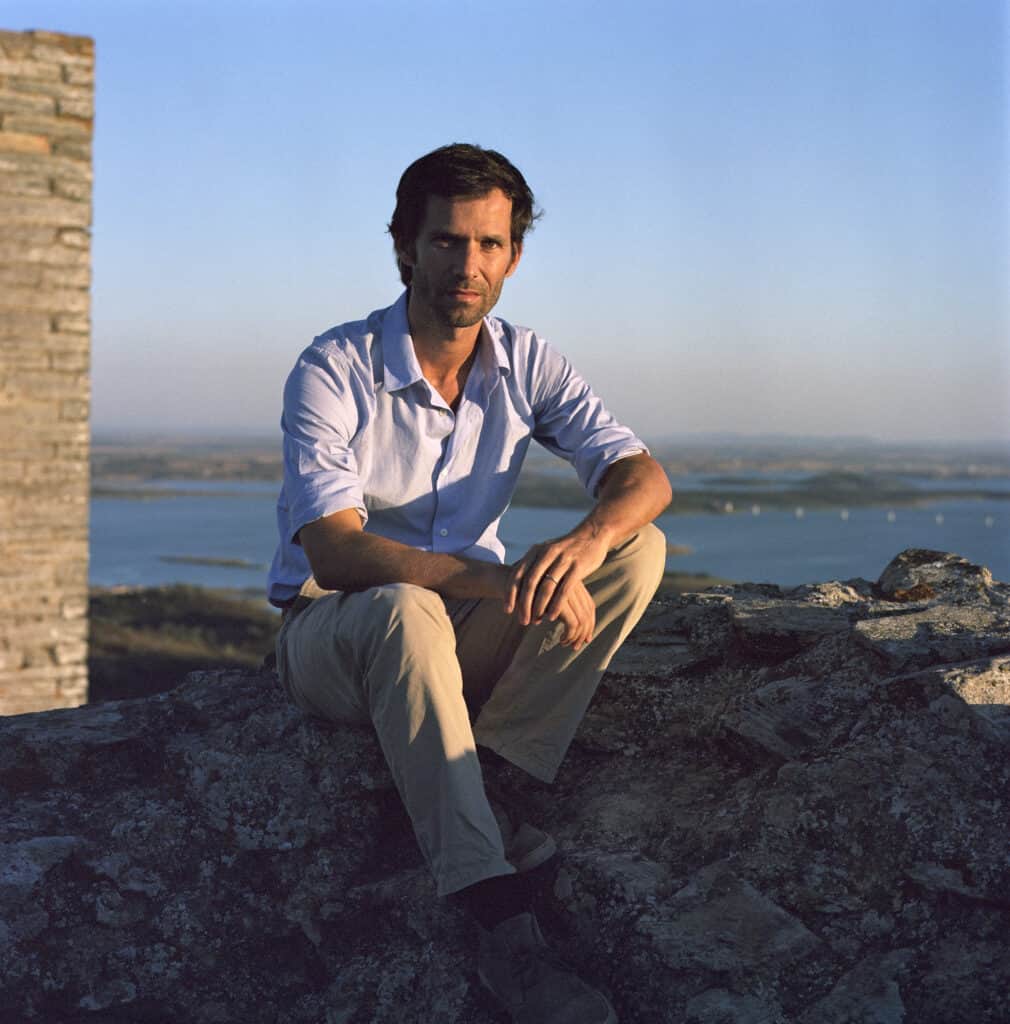
Mood of Living: What is your hometown?
José António Uva: Currently, I split my time between my family home in Lisbon and São Lourenço do Barrocal in the Alentejo.
MoL: Where did you go to school?
J.A.U: I studied at ESCP Europe and Harvard Business School.
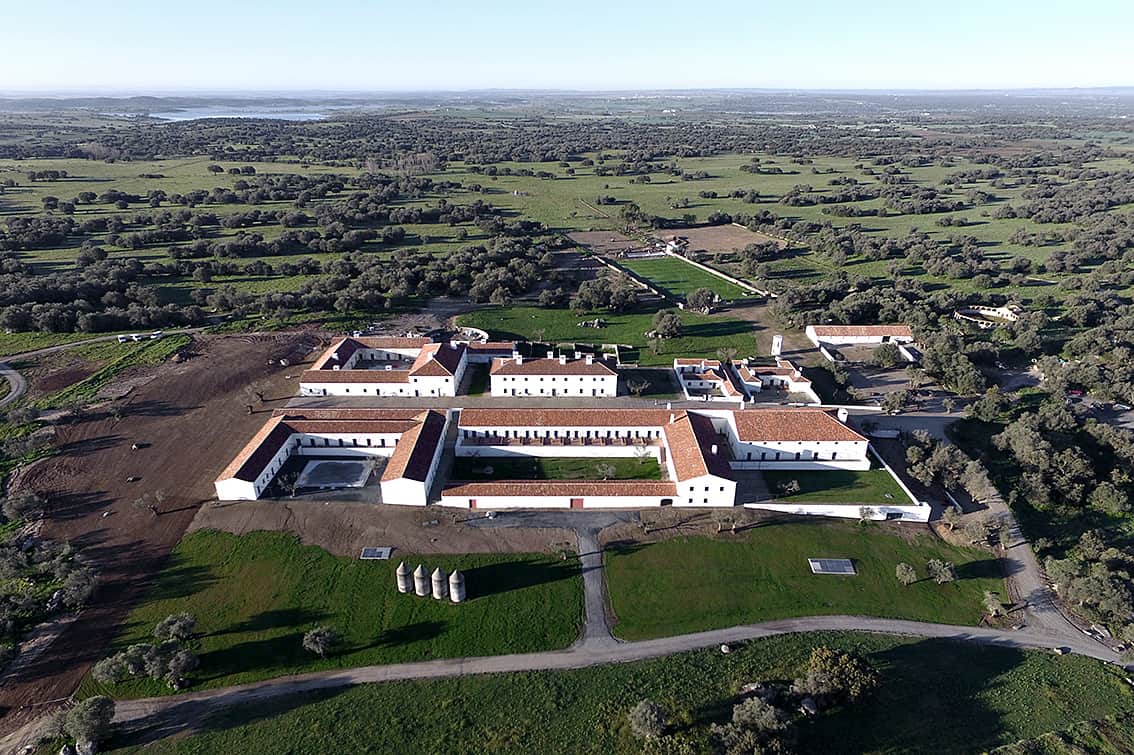
A bird’s-eye view of the estate.
MoL: What work did you do before running São Lourenço do Barrocal?
J.A.U: I worked previously at Saatchi & Saatchi as their Strategic Planning Director and as a Corporate Finance Analyst at UBS.
MoL: Describe the history of the property that is now São Lourenço do Barrocal. What path did it follow from its origins to its current state?
J.A.U: São Lourenço do Barrocal has remained in my family for over 200 years. It originated as a fully self-sufficient farm estate of almost 800 hectares supporting 50 families, with residents only leaving the estate to visit the annual textiles market. During Portugal’s political instability in the 1970s and the forced collectivization of farms in the region, the estate sadly fell into a state of disrepair. Having spent a lot of time at Barrocal as a child, I felt compelled to return to the Alentejo to bring the community back to life in a manner that respected the region’s unique ecology and ancient history. Alongside an inspiring team of local architects, designers and archaeologists, we spent over 14 years restoring the estate and transforming it to what it is today – a 19th century farmstead hotel, winery and spa set amongst ancient holm oaks, olive groves and vineyards.
The São Lourenço estate.
MoL: What was your experience spending time at the estate as a child? What is your fondest memory?
J.A.U: It was a family place (despite it being for everyone else a working farm), where friends and I would go rock climbing and get lost among the grasses and the big fields. I guess it is that freedom and that simplicity what makes me throwback with a smile in my face.
MoL: How has your relationship with the estate evolved over the course of your life and career?
J.A.U: It has become an even bigger commitment, not only in terms of business but also in terms of human relationships; it is definitely a labour of love and time that has been materializing over all these years.
The estate is a farm at its heart.
What was your vision for the modern day São Lourenço do Barrocal?
J.A.U: A rural retreat open to a global audience and a home for a budding community that will contribute to the thriving of the local area, while enjoying all the comforts of modern day life.
What challenges did you face transforming the property into what is it today? Did you anticipate the magnitude of the undertaking when you first started? What was most difficult about the restoration process?
J.A.U: Challenges sometimes were also blessings: the fact that everything just takes so much time to implement and move forward (mainly due to bureaucracy) is what ends up giving us time to dedicate to a project that needed it so much. I never anticipated that it would take me 14 years to open the hotel. With the naivety of my age, at that point, I just thought that it would take 4 or 5. One of the biggest tasks that we encountered was actually the allocation of the hospitality program in the old farming buildings, trying to solve it like a big puzzle, moving the spa back and forth, from building to building, changing the restaurant location 3 or 4 times, deciding where to hold the events and where to set the pool.
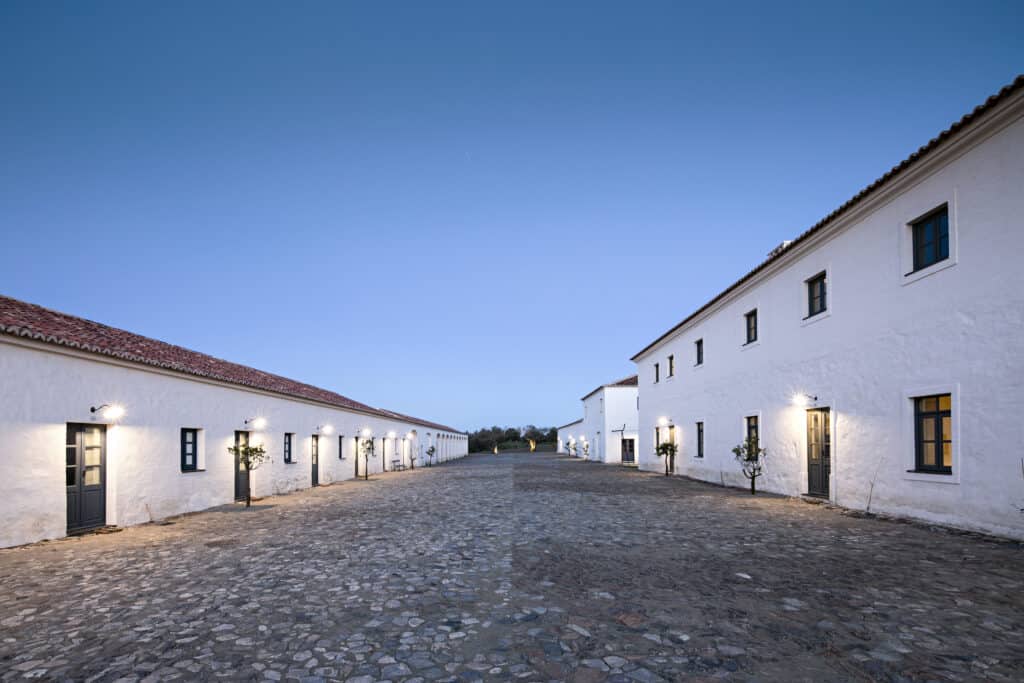
MoL: What has been most rewarding about renovating and running São Lourenço do Barrocal?
J.A.U: To see it thriving again and being enjoyed and lived in by so many interesting people, coming from all over the world; it has become quite a unique place and a destination per itself.
MoL: Tell us about Alentejo, the region in which São Lourenço do Barrocal is located. What is unique or notable about the culture, natural environment, and the history of this region? How is it changing, and in what ways has it stayed the same over time? What draws people to this region of the world?
J.A.U: The Alentejo is one of the best preserved landscapes and one of the least populated regions of southern Europe. It is becoming global but not globalized. It has a vast open landscape, that stretches inland, where we are located, from the beautiful west coast lined with white sand beaches. It’s a region of sun and farmlands, of tiny preserved medieval villages and the biggest artificial lake in Europe. It’s the land of cork oaks, olive trees and vineyards, of simple authentic food and the place to see the dark sky at night crowded with millions of stars. Fairly close to Lisbon, it occupies almost one-third of Portugal. Yet, somehow, it is still a confined region, inhabited by friendly people and a quiet charm.
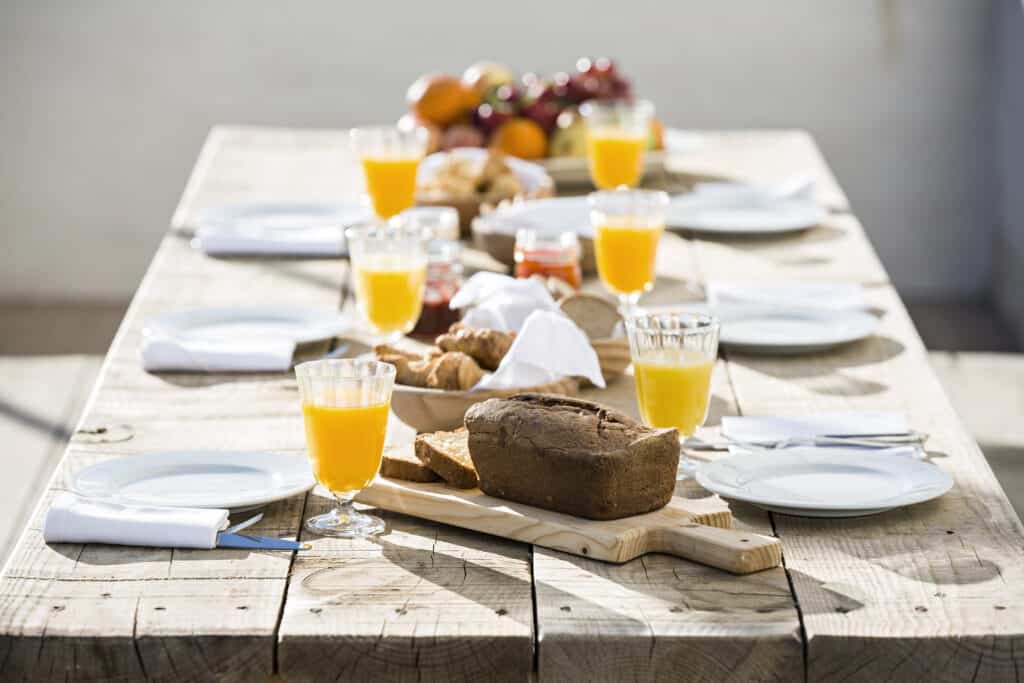
MoL: Where do guests stay at São Lourenço do Barrocal? How do the guest rooms reflect the history of the farm estate?
J.A.U: Guests stay in our spacious farm rooms and cottages, all housed in original farm buildings along a central cobbled street. The vernacular design showcases local craftsmanship and heritage features, and the interiors draw inspiration from the local farm villages – whitewashed walls and terra cotta brick floors are complemented by handcrafted wooden furnishings, softly-textured wool throws and artworks inspired by the history of the estate.
MoL: Tell us about the grounds of the estate — the meadow, orchard, and vegetable garden. How are plants grown on the estate incorporated into the hotel’s menu? In what other ways is sustainable ingredient sourcing incorporated into the dining experience? Do you work with local farmers and the regional community?
J.A.U: Absolutely, our culinary ethic is farm-to-table, celebrating local produce and flavors. Fruits, vegetables and olive oils are sourced from our organic garden and olive groves, and the rest of our organic produce is sourced from trusted local farmers and suppliers – including locally-farmed acorn-fed black pig, fresh artisanal goat’s cheese and traditional Alentejo bread.
The dining experience at São Lourenço.
MoL: Describe the restaurant experience at São Lourenço do Barrocal — the look, the food, the service. Who is your chef?
J.A.U: We have two restaurants at the estate, both with a farm-to-table ethic reflecting the bounty of the estate. In our main restaurant, our head chef, José Júlio Vintém honors traditional food from the region, employing a lightness to dishes usually looked at like being fairly substantial, including slow-roasted veal cheeks with sweet potato puree, acorn-fed pig with migas, a traditional brad stew and partridge escabeche. Our new restaurant Hortelão sits next door to the organic garden and introduces a simple and natural way of eating to the estate, with menus consisting of freshly-picked vegetables, chargrilled alongside locally sourced meat and fish.
MoL: Explain the history of wine-making at São Lourenço do Barrocal. What is the wine-making process at the estate like today? Who is the estate’s winemaker?
J.A.U: We have a thriving winery at the heart of the estate overseen by awarded winemaker Susana Esteban, with 15 hectares of vineyards producing eight varietals, used to create first-class single-estate wines under the regional Denominação de Origem Controloada (DOC). The region’s granite and schist soils produce elegant and powerful wines using indigenous Portuguese grapes. Our vineyards aren’t watered. They follow an integrated production method, which means they take full advantage of the climate and the local flora. Guests can bike to the vineyards and can also do a tour of the winery to learn about the process, followed by a wine tasting by the old wood-fired oven next door.
MoL: What makes the spa experience at the estate unique?
J.A.U: The estate is home to Susanne Kaufmann Spa Barrocal, and we offer indulgent results-driven treatments perfectly tailored to the needs of each guests using Susanne Kaufmann’s line of botanically-inspired organic products. Monastic in style, four treatment rooms branch off a 40m vaulted aisle, with a relaxation room, hydrotherapy room with cedar wood bathtub, dry saunas and a fitness studio also on offer.
The on-site spa.
MoL: São Lourenço do Barrocal is located within the Dark Sky Alqueva Reserve, the first designated Starlight Tourism Destination in the world. What opportunities are available to guests at the estate, or nearby, to help them take advantage of this prime stargazing location?
J.A.U: We work with astronomers at the nearby Alqueva Lake Observatory to offer our guests private stargazing experiences from within the estate. Astronomers will visit the estate with a telescope, and guests can spend a spectacular evening spotting shooting stars and constellations, with blankets and hot beverages on hand for the chillier evenings.
MoL: In what other ways can guests at the estate interact with nature during their stay?
J.A.U: The surrounding landscape offers endless opportunities for interaction with nature – we offer guided archaeological walks with the renowned local archaeologist, Manuel Calado, who will talk guests through the estate’s fascinating megalithic history. We also offer horse rides through the estate (our stables house our own sweet-natured Lusitano horses), and classic Portuguese bicycles are available for guests to explore the many trails. Keen birders can join one of our birdwatching tours to spot the 75 species of bird living on the estate, whilst our 20m outdoor pool provides a meditative space to swim, inset with a large granite barrocal rock in a nod to the surrounding landscape.
São Lourenço has an exquisite winery.
MoL: What are the other activities available for guests?
J.A.U: We offer a range of activities both in and outside the estate. On site we offer artisan-bread making workshops, cooking classes and pottery workshops, or trail running, yoga and pilates classes for active types. However we strongly encourage our guests to venture beyond the estate and explore the wider Alentejo region and offer visits up to the nearby medieval village of Monsaraz, where guests can explore the range of traditional boutiques, potteries and tapestries. Outside the estate we also offer boat trips on the Alqueva Lake, hot air balloon rides and cycling tours.
MoL: How is sustainability incorporated into the estate? Can you tell us about your partnership with the Green Globe brand?
J.A.U: Sustainability is part of the old farm village’s DNA and therefore has become part of us: the 50 families that live here prospered under a virtuous cycle of self-sustainability, producing on site everything they needed, from rooftop tiles to terra cotta bricks, from bread, through cheeses, meats and cereals. There were blacksmiths and carpenters and an irrigation system based on an aqueduct, a water tower and a set of water wells. This philosophy of working with and from the land is something that we’re keen on preserving, as is the relationship with the local community and the local economy. We want to foster a type of tourism concerned in respecting and experiencing all the authenticity the area has to offer. Green Globe’s partnership has set specific goals for us in order to achieve this.
The guest rooms of the estate.
MoL: In a time when much of the world is moving further and further away from the simple lifestyles embodied by places like São Lourenço do Barrocal, what do you think is the value of preserving them?
J.A.U: These simple lifestyles need to continue to exist to help us breathe from our hectic lives, acting as a buffer and leaving us space to think and engage with all our senses.
MoL: What do you hope that those who visit the estate take away from their experience there?
J.A.U: A love connection with our project and an understanding of local culture.
MoL: How has the progress of technological advancement impacted the work you do, either positively or negatively?
J.A.U: Technology can always be an ally even in projects like ours. It helps us provide a smoother and faster service to our clients but also to be more present in their lives if that’s their wish.
MoL: Is there any feedback you’ve received from guests that has been particularly meaningful?
J.A.U: When guests compliment our team, it is such a joy! When they say they have never been made to feel more welcome in any hotel they’ve stayed in and that everyone they met went the extra mile to make their stay comfortable and enjoyable, it is really something special.
MoL: What is your living space like? Do you entertain guests? Do you cook? If so, would you be willing to share a favorite recipe with us?
J.A.U: It’s a bright, airy room, in one of Lisbon’s old and historic buildings. Yes! Though I do not have the time I wished for, I do entertain some friends and family and even sometimes new acquaintances. I like very much to know new people. My wife Ana loves to bake and I like to make fresh salads. Though my favorite recipe is a pre-dinner gin with a lemon peel.
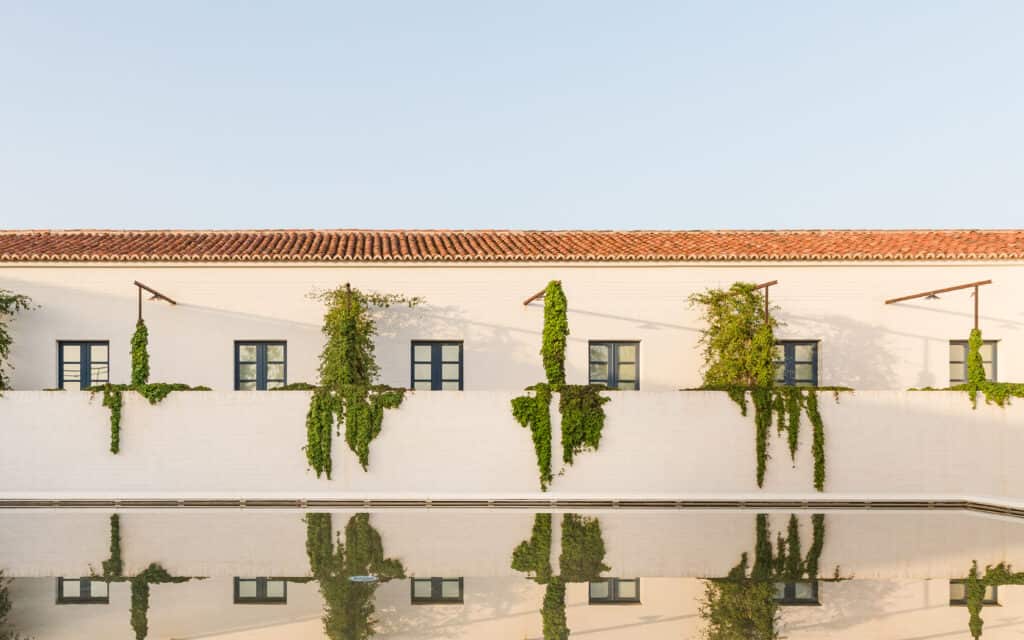
The estate has an idyllic, rustic feel. (Photo by Ash James)
MoL: What are your hobbies?
J.A.U: Biking, horseback riding and reading.
MoL: Where do you go for peace of mind?
J.A.U: I try to squeeze into a jazz concert.
MoL: Do you have any words of wisdom?
J.A.U: Just let things take their time.
Photography courtesy of Nelson Garrido, São Lourenço do Barrocal

FORESTIS is a luxury, eco-conscious retreat nestled in the beautiful Dolomite Mountains of Italy.
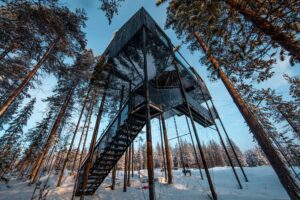
How Kent Lindvall and Britta Jonsson-Lindvall created eight unique Swedish tree houses, interweaving design and sustainability.
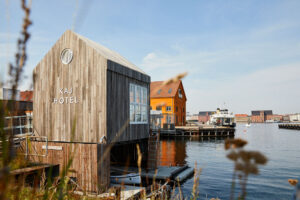
KAJ Hotel is a sustainable, simple two- to four-person houseboat hotel located in the Holmen neighborhood of Copenhagen, Denmark.